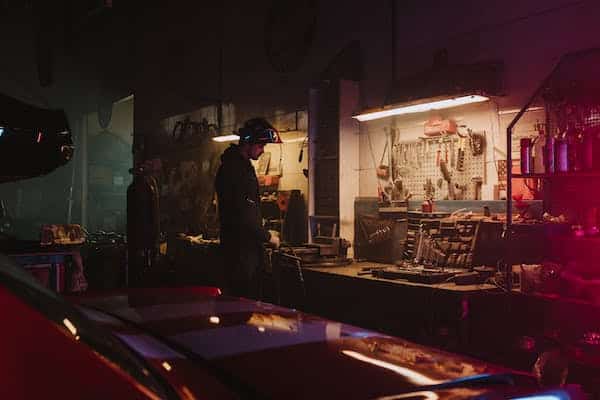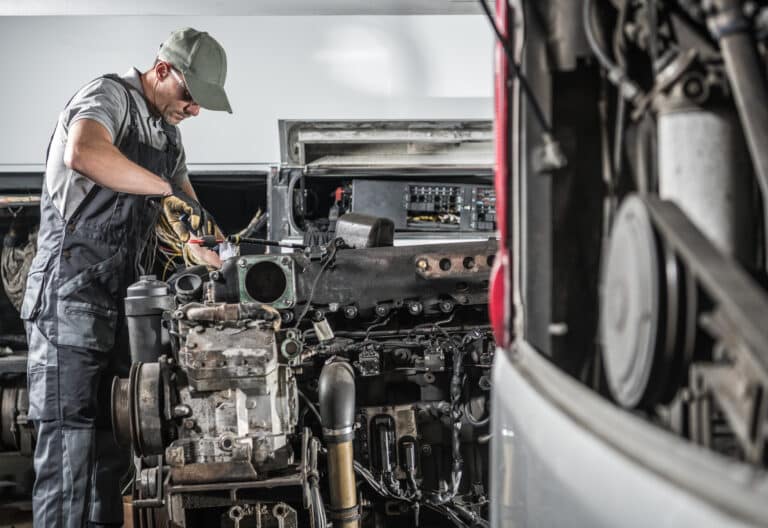Diesel mechanics are technicians that inspect, maintain, and repair automobiles related to diesel engines.
The process of getting certified can get confusing at times, and it can get difficult to pick the right certification with several certifications available.
Read on to clear all your doubts about the required certifications for diesel mechanics, how they differ, and which ones are the best suited for you.

What is a Diesel Mechanic Certification?
A diesel mechanic certification can be described as a piece of document that tells an employer or a customer that a person has the relevant knowledge and training to maintain and repair diesel engine-powered automobiles. Customers, as well as employers nowadays, require diesel mechanics to be certified before hiring them.
These certifications can range from basic knowledge of one type of vehicle or aspect of diesel mechanics to advanced certifications. Diesel mechanics usually have to keep re-certifying to keep themselves updated with new knowledge and technologies.
Getting your diesel mechanic certifications is one of the most reliable ways of ensuring your employment, and it also might help you land a higher-than-average salary.
Also, these certifications may help self-employed diesel mechanics, as they build trust among the customers. Getting certified as a diesel mechanic will also help customers find you through registries. Such customers might end up paying you higher than average, depending on your performance.
Read More: What is a Diesel Mechanic?
Types Of Diesel Mechanic Certifications
As mentioned earlier, there are various types of diesel mechanic certifications. It is always beneficial to get to know about them before you apply for one.
Let’s take a look at some of the main types of certifications required for diesel mechanics:
G1 Certification
As per the requests made by the automotive industries across the nation, a new entry-level certification was introduced in June 2013, called the G1 Certification. This certification aims at determining the skills and knowledge of a diesel technician over a wide range of automobile systems related to light repair.
To get the G1 Certification, you will have to first complete your high school diploma or a GED as well as enroll yourself in diesel mechanic school.
Unlike other ASE Certifications, the G1 Certification is valid for up to a duration of 5 years, and once you clear the certification exam, you will be able to get a shoulder insignia, a wall certificate, and a wallet card.
Automotive Service Excellence (ASE) Certification
The Automotive Service Excellence (ASE) Certification comprises automotive repairs for a variety of vehicles, and these certifications usually have different levels. For instance, the first level of certification is generally for specific kinds of electronic systems or diesel engines.
The ASE certification requires you to clear a test in an area of your choice, like medium-heavy trucks or electrical systems. The many areas in which you can get certifications are as follows:
- A9 Light vehicle diesel engines
- T2 Medium-Heavy truck diesel engines
- H2 Transit bus diesel engines
- S2 School bus diesel engines
- A6 Auto and light truck
- H6 Transit bus
- S6 School bus
- T6 Medium-Heavy truck

After this comes the L2 electronic diesel engine diagnostic specialist certification, which requires you to complete a test from both the diesel engine and electrical/electronic system categories.
The most prominent aspect of ASE Certification is that it can offer you a master technician certification if you clear every vehicle category certification exam. Additionally, ASE certs are valid for 5 years, post which you can apply for re-certify.
American Boat And Yacht Council (ABYC) Certification
The ABYC Certification, or the American Boat And Yacht Council Certification, provides certifications for mechanics specializing in boat repairs and maintenance. In case you are interested in working with marine vehicles and transport systems, then you can get an ABYC Certification in any of these areas:
- A/C Refrigeration
- ABYC Standards
- Advanced Marine Electrical
- Diesel Engines
- Gasoline Engines
- Marine Composites
- Marine Corrosion
- Marine Electrical
- Marine Systems
If you clear three or more of these tests, you can receive the master technician certification. The ABYC Certification is valid for 5 years, and in case of renewal, you will have to continue the educational requirements, which typically involve 10 hours of coursework and a recertification exam.
Heavy Equipment Certifications
The National Center for Construction Education and Research provides certifications in heavy equipment or machinery operations. By learning how to operate such machinery, you can gain knowledge and skills to repair and maintain such vehicles whenever necessary.
Ultimately, it has been seen that ASE certifications are regarded as the holy grail for diesel mechanics.
Salary Expectations & Job Outlook for Certified Diesel Mechanics
The U.S. Bureau of Labor Statistics (BLS) reported that the national average diesel technician salary was $48,690, or $23.41 per hour.
These figures are dependent on a variety of influencing factors, such as the job location, experience, number of certifications, and knowledge and skill set of the candidate. If you’re just starting in this field, it is highly recommended that you gain the relevant skills and gain an edge over other applicants.
The BLS also reported that the expected growth for diesel mechanics jobs was going to be around 4% by the year 2031, which makes this profession at par with others.
Plus, the demand for diesel mechanics has also constantly been on the rise, so the job prospects for this profession look fairly positive for the upcoming years.

How to Become a Diesel Mechanic?
If you’re interested in pursuing a career in the field of diesel mechanics, you might be wondering how to become a diesel mechanic.
Even though the process of becoming a diesel mechanic sounds intimidating, it is not really that difficult. Your main focus should be to choose the right diesel mechanic training, as that will help you gain all the relevant knowledge and skills you will need when you enter the workforce.
Diesel Mechanic Training Requirements
The minimum requirement for you to become a diesel mechanic is to first complete your high school diploma or a GED. After that, you have to enroll yourself in a diesel mechanic school. Choosing the right type of training will help you start your career faster as a diesel mechanic.
There are three different methods by which you can get your diesel mechanic training, such as getting an associate’s Diesel Technician degree, certification programs, and online training programs.
Here is more about each type of training program:
Associate Degrees
- Timeline: 2 Years
- Cost: $30,000-$50,000
You can get an associate’s degree by enrolling yourself in a full-time course at a university after you complete your GED or high school diploma.
An associate’s degree is a 2-year program that helps understand all the basics of diesel mechanics. Multiple colleges offer associate degree programs in a 2+2 format where students can get their degrees after 2 years of bachelor’s degree. These programs, however, cost a fortune. An average associate’s degree costs around $30,000 to $50,000 and thus may often require students to take on education loans.
Certification Programs
- Timeline: 1 Year
- Cost: $5,000-$10,000
In case you are willing to get a certified degree for becoming a diesel mechanic a bit quicker, then you can opt for Certification Programs. These are one-year programs that assist you with understanding the basics and skills required for this profession. These programs will allow you to have a completion certificate in just one year as compared to the associate degree, which is a 2-year program.
Certification programs are typically offered by vocational colleges, and they cost around $5,000 to $10,000, which is significantly lower than an associate’s degree.
Online Programs
- Timeline: 6-12 Months
- Cost: $5,000
Online programs are considered to be the best out of all the options available. This is because choosing an online program will get you a certification faster, in as little as 6 months.
These programs also offer you to learn at your own pace, time, and schedule and are way cheaper than an associate’s degree or a certification program, costing under $5,000.
You can complete an online program in 6-12 months. This is also helpful for those who are into some part-time jobs.
Next Steps after Completing Your Education
Although the diesel mechanic training requirements vary from employer to employer, there are majorly three ways of getting training for this profession.

Also, every technician has a different route to follow to reach the pinnacle, however, diesel mechanics follow a certain path to become one. These are as follows:
- Get Your CDL
The next step in becoming a diesel technician is to get your CDL or a Commercial Driver’ License. This will make you gain a legal license to operate heavy machinery. It is required to get your CDL after you complete your training and before you sit for your certification exams.
- Become ASE Certified
After you complete your training and get a CDL, you will need to sit for your certification exam. For diesel mechanics, the main certification authority is Automotive Service Excellence.
If you’re just starting out, getting a G1 certification is recommended. This certification is highly preferred by employers.
As you gain experience, it is recommended that you clear and get as many ASE certifications
- Look for externships
Even though some online programs and training offer externship opportunities, you can also look for other opportunities on your own.
Getting an externship is considered to be vital for diesel mechanics, as they offer you the appropriate hands-on training and skills that you would need to fulfill everyday tasks within the workshop. This can mean working with diesel mechanic tools or handling repairs.
Externships also assist you in attaining industry experience and a chance for more practical knowledge, and once your externship gets over, you also have the option of continuing within the same company or workshop, depending on your performance.
If you’re wondering what duties you’ll have to perform, check out What does a diesel mechanic do?
- Apply for Jobs
The final step is to make your diesel mechanic resume impressive by honing all the relevant skills you would need as a diesel mechanic.
Finally, you can apply for a Diesel Mechanic Apprenticeship or apply in your shortlisted companies and workshops.
Related:
- Diesel Mechanic Job Description
- Diesel Mechanic Requirements
- Mobile Diesel Mechanic
- Heavy Duty Mechanic
- Marine Diesel Mechanic
- How long is diesel mechanic school
- Diesel Mechanic Salary Texas
- Diesel Mechanic Salary Florida
- Diesel Mechanic Salary California





